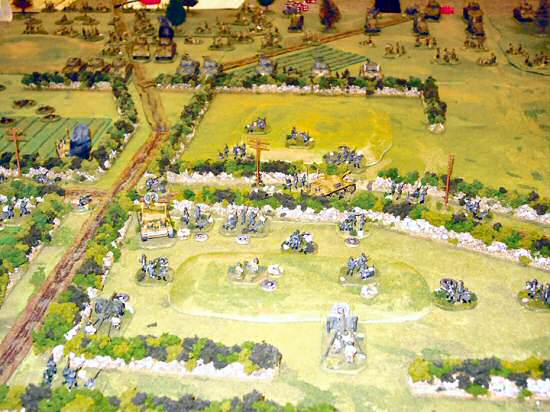
I was surprised to discover that the original 1926 silent movie of Beau Geste is available, with a musical score reconstructed from original records, on YouTube.
As this movie was filmed only two years after publication of the novel, it is almost contemporaneous with the fictional story.
The movie closely follows the presentation of the novel, but condensing the action and eliminating some of the minor characters. The three brothers are considerably older than in the novel. A secret kept until late in the novel is revealed earlier in the movie, making the ending less of a surprise.
The plot begins with a relief force arriving at Fort Zinderneuf, only to find the attacking Arabs gone, and the fort manned by silent defenders – silent because they are dead, but propped up along the parapets with weapons ready! The commandant of the fort has been slain with a bayonet… but then the body disappears… and then Fort Zinderneuf burns down!
Flashback to fifteen years before. Lady Patricia of Brandon Abbas takes care of her niece, Isobel, and three orphaned brothers: Michael 'Beau' Geste, his twin Digby Geste, and younger John Geste. After staging a mock naval battle in the pond, followed by a 'Viking funeral', Michael is hiding behind a suit of armor when he accidentally learns a secret.
Flash forward. Lady Patricia has received word that her long-absent husband is returning, and he plans to sell his treasure, the Blue Waters sapphire. The gem is produced for Lady Patricia and her friends to admire… but the lights go out, and the gem is missing when the lights come on again!
Shortly after, Isobel catches John Geste leaving the home. He shows her letters from Beau and Digby, each claiming to have stolen the gem, and says he too must go into exile.
John travels to France and enlists in the Foreign Legion, only to find his brothers already there! The brothers befriend two Americans, Hank and Buddy. A treacherous Italian, Boldini, eavesdrops on them and concludes they are jewel thieves with a valuable diamond. Boldini informs Lejaune, a sadistic sergeant who schemes to get the jewel for himself. Eventually, John finds himself stationed at remote Fort Zinderneuf in the Sahara. Will Boldini steal the gem? Will the Arabs attack? Will the cafard drive everyone crazy? Will the men mutiny against cruel Lejaune? And what about the missing Blue Waters?
Noah Beery steals the show as Lejaune, in a memorable performance. William Powell is excellent in a minor role as Boldini. Victor McLaglen makes an impression as the towering Hank. Ronald Colman as Beau isn't given much to do, but he looks suitably heroic. The other performers are adequate.
For a silent movie from 1926, the movie is surprisingly modern in look. The musical score uses both original music and well-known symphonic music. The film avoids depicting combat injuries or even blood. Camels make a token appearance, but most of the Arabs ride horses.
I don't watch a lot of silent movies, but this one was a pleasure to watch. Recommended.











